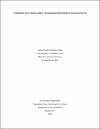Mostrar el registro resumido del documento
Arquitectura de los sueños: análisis y deconstrucción del montaje en secuencias oníricas
| dc.contributor.advisor | Aros, Andrés |
| dc.creator | Villalobos-Criollo, Luis Alejandro |
| dc.creator | Carvajal-Osorio, Maria Camila |
| dc.creator | Moreno-Real, Nicolas |
| dc.creator | Rodriguez-Pardo, Alisson Paola |
| dc.date.accessioned | 2020-09-21T23:17:56Z |
| dc.date.available | 2020-09-21T23:17:56Z |
| dc.date.created | 2020-08-14 |
| dc.identifier.uri | http://repositorio.uniagustiniana.edu.co//handle/123456789/1410 |
| dc.description | La problemática del ejercicio de montar secuencias oníricas sin contar con una guía o manual, es la base que sirve a la investigación para hallar recursos, características y elementos que compartan ciertas secuencias oníricas escogidas de las películas: Sherlock Jr. (Buster Keaton, 1924), La escalera de Jacob (Adrian Lyne, 1990) y Eterno resplandor de una mente sin recuerdos (Michel Gondry, 2004), a partir del análisis que se obtiene del texto “una propuesta de análisis cinematográfico integral” de Aristizabal y Pinilla en conjunto con los textos “las muertes del cine colombiano” de Oswaldo Osorio y “el montaje cinematográfico” de Joan Marimón, que se refleje en la creación de un marco de orientación técnico, cuyo contenido pueda ser aplicado a cualquier secuencia audiovisual con características oníricas o de ensueño. Tomando de ejemplo la adaptación de dicho marco, el cortometraje universitario Ópera prima, será el punto de partida para realizar una reflexión en torno a la creación práctica del montaje apoyado en un texto. |
| dc.description.abstract | The problem of the exercise of assembling dream sequences without having a guide or manual, is the basis that serves to research to find resources, characteristics and elements that share dream sequences chosen from the films: Sherlock Jr. (Buster Keaton, 1924), Jacob's ladder (Adrian Lyne, 1990) and Eternal sunshine of the spotless mind (Michel Gondry, 2004), based on the analysis obtained from the text " Film analysis: A comprehensive methodological approach” by Aristizabal and Pinilla in conjunction with the texts "the deaths of Colombian cinema" by Oswaldo Osorio and "the cinematographic montage" by Joan Marimón, which is reflected in the creation of a technical orientation framework, the content of which can be applied in any audiovisual sequence with dreamlike or dreamlike characteristics. Taking the adaptation of this framework as an example, the university short film Ópera prima, will be the starting point for a reflection on the practical creation of montage supported by a text. |
| dc.format.mimetype | application/pdf |
| dc.language.iso | spa |
| dc.rights | Atribución-NoComercial-CompartirIgual 4.0 Internacional |
| dc.rights.uri | http://creativecommons.org/licenses/by-nc-sa/4.0/ |
| dc.source | instname:Universitaria Agustiniana |
| dc.source | reponame:Repositorio Institucional UniARI |
| dc.subject | Montaje |
| dc.subject | Secuencia onírica |
| dc.subject | Análisis cinematográfico |
| dc.subject | Marco de orientación técnico |
| dc.title | Arquitectura de los sueños: análisis y deconstrucción del montaje en secuencias oníricas |
| dc.type | info:eu-repo/semantics/bachelorThesis |
| dc.rights.accesRights | info:eu-repo/semantics/openAccess |
| dc.rights.acceso | Abierto (Texto Completo) |
| dc.subject.lemb | Arte cinematográfico |
| dc.subject.lemb | Cine fantástico |
| dc.subject.lemb | Cine - Montaje |
| dc.subject.keyword | Montage |
| dc.subject.keyword | Dream sequence |
| dc.subject.keyword | Cinematographic analysis |
| dc.subject.keyword | Technical orientation framework |
| dc.type.hasVersion | info:eu-repo/semantics/acceptedVersion |
Archivos en el documento
Este documento aparece en la(s) siguiente(s) colección(ones)
 Esta obra está bajo licencia internacional Creative Commons Reconocimiento-NoComercial 4.0.
Esta obra está bajo licencia internacional Creative Commons Reconocimiento-NoComercial 4.0.

